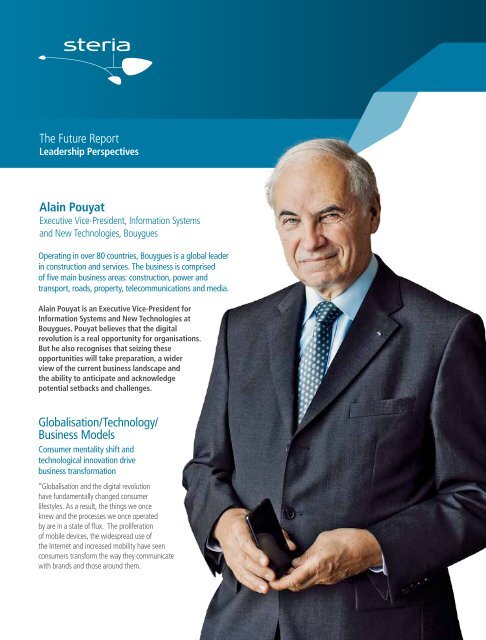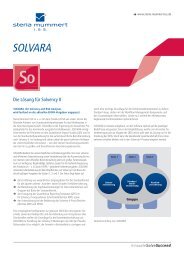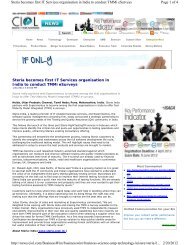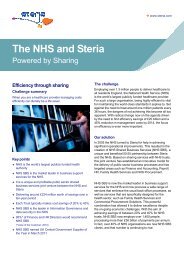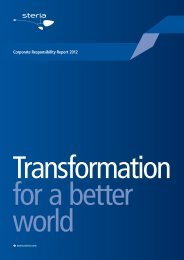Alain Pouyat - Steria
Alain Pouyat - Steria
Alain Pouyat - Steria
Create successful ePaper yourself
Turn your PDF publications into a flip-book with our unique Google optimized e-Paper software.
The Future Report<br />
Leadership Perspectives<br />
<strong>Alain</strong> <strong>Pouyat</strong><br />
Executive Vice-President, Information Systems<br />
and New Technologies, Bouygues<br />
Operating in over 80 countries, Bouygues is a global leader<br />
in construction and services. The business is comprised<br />
of five main business areas: construction, power and<br />
transport, roads, property, telecommunications and media.<br />
<strong>Alain</strong> <strong>Pouyat</strong> is an Executive Vice-President for<br />
Information Systems and New Technologies at<br />
Bouygues. <strong>Pouyat</strong> believes that the digital<br />
revolution is a real opportunity for organisations.<br />
But he also recognises that seizing these<br />
opportunities will take preparation, a wider<br />
view of the current business landscape and<br />
the ability to anticipate and acknowledge<br />
potential setbacks and challenges.<br />
Globalisation/Technology/<br />
Business Models<br />
Consumer mentality shift and<br />
technological innovation drive<br />
business transformation<br />
“Globalisation and the digital revolution<br />
have fundamentally changed consumer<br />
lifestyles. As a result, the things we once<br />
knew and the processes we once operated<br />
by are in a state of flux. The proliferation<br />
of mobile devices, the widespread use of<br />
the Internet and increased mobility have seen<br />
consumers transform the way they communicate<br />
with brands and those around them.
The increasing emphasis on sustainability in light of global warming<br />
and carbon emissions has also provoked a shift in consumer mentality<br />
towards an environmentally-conscious, ‘carbon-free’ thinking,<br />
which highlights how our relationship with the world is evolving.<br />
In order to achieve sustainable growth in today’s changing<br />
marketplace, companies cannot afford to become complacent. The<br />
companies that will flourish will be the ones that are looking to<br />
the future trends predicted to transform the business landscape,<br />
and are seeking to influence social, societal and technological<br />
shifts that can be harnessed to effect business change.<br />
Thanks to increased connectivity and mobility, today’s technological<br />
innovations have brought about a new era of collaboration where<br />
individuals and business entities from across the globe meet to<br />
share the burden of business challenges and research, test and learn<br />
from new models and strategies. The pooling of skills and services,<br />
both within the organisation and externally and the outsourcing of<br />
certain aspects of business to domain experts will become essential<br />
and more commonplace in the years to come. Bouygues is a great<br />
example of how bringing together different departments of a business<br />
can help solve challenges. Combining construction and laboratory<br />
research to devise new and innovative construction procedures is at<br />
the heart of what we do. Regardless of business function or industry,<br />
it’s clear that businesses will need to collaborate to ride out the<br />
wave of the sea of change currently happening in the industry.”<br />
Energy/Technology/<br />
Population/Urbanisation<br />
New technology brings together digital<br />
and traditional industries<br />
“The digital revolution has impacted each of Bouygues’ business<br />
lines in different ways. Bouygues Telecom has played an active part<br />
in this shift, with its telecommunications business at the heart of<br />
the digital revolution. The media branch of the company, TF1, has<br />
witnessed upheaval as relationships between TV networks and<br />
viewers evolve. The advent of digital terrestrial television has led to<br />
the emergence of new channels which have completely transformed<br />
French broadcasting (the number of channels available has increased<br />
from six to a whopping 25). Connected television also brings its<br />
own revolution with access to non-linear services such as catch-up<br />
TV, video on demand and access to a plethora of online content.<br />
Digital is integral to many of the fundamental changes currently<br />
taking place in more traditional sectors such as construction. The<br />
creation of environmentally-friendly products and services that<br />
consume less energy has spurred the development of a brand new<br />
generation of buildings, neighbourhoods and even entire ‘eco-cities’.<br />
The concept behind all of these vast industry changes is<br />
convergence. Different sectors now benefit from innovations<br />
developed in previously unrelated industries since they<br />
now draw on the same digitally-led resources.<br />
Of course, there is still a long way to go. As the old adage<br />
goes – ‘Rome wasn’t built in a day’. The same can be said<br />
of the society of tomorrow that is being shaped by the<br />
innovations of today. Nevertheless, it opens up tremendous<br />
opportunities for new developments for all types of business<br />
provided they can identify the new needs of clients sufficiently<br />
early on, and are capable of adapting appropriately.”


